- Home
- Neal Stephenson
Diamond Age or a Young Lady's Illustrated Primer Page 41
Diamond Age or a Young Lady's Illustrated Primer Read online
Page 41
“I am, of course, aware that I have favorable prospects in the Atlantan phyle,” Nell said, “but I do not think that it would be fitting for me to take the straight and narrow path. I am going to China now to seek my fortune.”
“Well,” Constable Moore said, “look out for the Fists.” His gaze wandered over his battered and filthy armor and came to rest on the floating helmet. “They are coming now.”
The best explorers, like Burton, made every effort to blend in. In this spirit, Nell stopped at a public M.C., doffed her long dress, and compiled a new set of clothes– a navy blue skin-tight coverall emblazoned with SHIT HAPPENS in pulsating orange letters. She swapped her old clothes for a pair of powered skates on the waterfront, and then headed straight for the Causeway. It rose gently into the air for a few miles, and then the Pudong Economic Zone came into view at her feet, and Shanghai beyond that, and she suddenly began to pick up speed and had to cut the skates’ power assist. She’d passed over the watershed now. Nell was alone in China.
The Hackworths have a family reunion;
Hackworth strikes out on his quest;
an unexpected companion.
Atlantis/Seattle was designed small and to the point; the narrow, convoluted straits of Puget Sound, already so full of natural islands, did not leave much room for artificial ones. So they had made it rather long and slender, parallel to the currents and the shipping lanes, and been rather stingy when it came to the parks, meadows, heaths, gentleman farms, and country estates. Much of the Seattle area was still sufficiently rich, civilized, and polite that New Atlantans did not object to living there, and little Victorian mini-claves were scattered about the place, particularly east of the lake, around the misty forest domains of the software khans. Gwen and Fiona had taken a townhouse in one of these areas.
These tiny bits of New Atlantis stood out from the surrounding forest in the same way that a vicar in morning coat and wing collar would have in the cave of the Drummers. The prevailing architecture here, among those who had not adopted neo-Victorian precepts, was distinctly subterranean; as if these people were somehow ashamed of their own humanity and could not bear to fell even a handful of the immense Douglas firs that marched monotonously up the tumbling slopes toward the frozen, sodden ridge of the Cascades. Even when it was half buried, a house wasn’t even a proper house; it was an association of modules, scattered about here and there and connected by breezeways or tunnels. Stuck together properly and built on a rise, these modules might have added up to a house of substance, even grandeur; but to Hackworth, riding through the territory on his way to visit his family, it was all depressing and confusing. Ten years among the Drummers had not affected his Victorian aesthetics. He could not tell where one house left off and the next one began, the houses were all intertangled with one another like neurons in the brain.
His mind’s eye again seemed to seize control of his visual cortex; he could not see the firs anymore, just axons and dendrites hanging in black three-dimensional space, packets of rod logic maneuvering among them like space probes, meeting and copulating among the nerve fibers.
It was a bit too aggressive to be a reverie and too abstract to be a hallucination. It didn’t really clear away until a gust of cold mist hit him in his face, he opened his eyes, and realized that Kidnapper had stopped after emerging from the trees at the crest of a mossy ridgeline. Below him was a rocky bowl with a few cobblestone streets sketched out in a grid, a green park lined with red geraniums, a church with a white steeple, whitewashed four-story Georgian buildings surrounded by black wrought-iron fences. The security grid was tenuous and feeble; the software khans were at least as good at that kind of thing as Her Majesty’s specialists, and so a New Atlantis clave in this area could rely on the neighbors to shoulder much of that burden.
Kidnapper picked its way carefully down the steep declivity as Hackworth looked out over the tiny clave, musing at how familiar it seemed. Since leaving the Drummers, he hadn’t gone more than ten minutes without being seized by a feeling of déjà vu, and now it was especially strong. Perhaps this was because, to some degree, all New Atlantis settlements looked alike. But he suspected that he had seen this place, somehow, in his communications with Fiona over the years.
A bell clanged once or twice, and teenaged girls, dressed in plaid uniform skirts, began to emerge from a domed school. Hackworth knew that it was Fiona’s school, and that she was not entirely happy there. After the crush of girls had gone out of the place, he rode Kidnapper into the school yard and sauntered once around the building, gazing in the windows. Without much trouble he saw his daughter, sitting at a table in the library, hunched over a book, evidently as part of some disciplinary action.
He wanted so badly to go in and put his arms around her, because he knew that she had spent many hours suffering like punishments, and that she was a lonely girl. But he was in New Atlantis, and there were proprieties to be observed. First things first. Gwendolyn’s townhouse was only a few blocks away. Hackworth rang the bell, determined to observe all of the formalities now that he was a stranger in the house.
“May I ask what your visit is regarding?” asked the parlourmaid, as Hackworth spun his card onto the salver. Hackworth didn’t like this woman, who was named Amelia, because Fiona didn’t like her, and Fiona didn’t like her because Gwen had given her some disciplinary authority in the household, and Amelia was the sort who relished having it. He tried not to confuse himself by wondering how he could possibly know all of these things.
“Business,” Hackworth said pleasantly. “Family business.”
Amelia was halfiway up the stairs when her eyes finally focused on Hackworth’s card. She nearly dropped the salver and had to clutch at the banister with one hand in order to keep her balance. She froze there for a few moments, trying to resist the temptation to turn around, and finally surrendered to it. The expression on her face was one of perfect loathing mixed with fascination.
“Please carry out your duties,” Hackworth said, “and dispense with the vulgar theatrics.”
Amelia, looking crestfallen, stormed up the stairs with the tainted card. There followed a good deal of muffled commotion upstairs. After a few minutes, Amelia ventured as far down as the landing and encouraged Hackworth to make himself comfortable in the parlor. He did so, noting that in his absence, Gwendolyn had been able to consummate all of the long-term furniture-buying strategies she had spent so much time plotting during the early years of their marriage. Wives and widows of secret agents in Protocol Enforcement could rely on being well cared for, and Gwen had not allowed his salary to sit around collecting dust.
His ex-wife descended the stairway cautiously, stood outside the beveled-glass parlor doors for a minute peering at him through the gauze curtains, and finally slipped into the room without meeting his gaze and took a seat rather far away from him. “Hello, Mr. Hackworth,” she said.
“Mrs. Hackworth. Or is it back to Miss Lloyd?”
“It is.”
“Ah, that’s hard.” When Hackworth heard the name Miss Lloyd, he thought of their courtship.
They sat there for a minute or so, not saying anything, just listening to the ponderous ratcheting of the grandfather clock.
“All right,” Hackworth said, “I won’t trouble you talking about extenuating circumstances, as I don’t ask for your forgiveness, and in all honesty I’m not sure that I deserve it.”
“Thank you for that consideration.”
“I would like you to know, Miss Lloyd, that I am sympathetic to the step you have taken in securing a divorce and harbour no bitterness on that account.”
“That is reassuring to know.”
“You should also know that whatever behaviour I engaged in, as inexcusable as it was, was not motivated by rejection of you or of our marriage. It was not, in fact, a reflection upon you at all, but rather a reflection upon myself.”
“Thank you for clarifying that point.”
“I realize that any hope I might harb
our in my breast of rekindling our former relationship, sincere as it might be, is futile, and so I will not trouble you after today.”
“I cannot tell you how relieved I am to hear that you understand the situation so completely.”
“However, I would like to be of service to you and Fiona in helping to resolve any loose ends.”
“You are very kind. I shall give you my lawyer’s card.”
“And, of course, I look forward to reestablishing some sort of contact with my daughter.”
The conversation, which had been running as smoothly as a machine to this point, now veered off track and crashed. Gwendolyn reddened and stiffened.
“You– you bastard.”
The front door opened. Fiona stepped into the foyer carrying her schoolbooks. Amelia was there immediately, maneuvering around with her back to the foyer doors, blocking Fiona’s view, talking to her in low angry tones.
Hackworth heard his daughter’s voice. It was a lovely voice, a husky alto, and he would have recognized it anywhere. “Don’t lie to me, I recognised his chevaline!” she said, and finally shouldered Amelia out of the way, burst into the parlor, all lanky and awkward and beautiful, an incarnation of joy. She took two steps across the oriental rug and then launched herself full-length across the settee into her father’s arms, where she lay for some minutes alternately weeping and laughing.
Gwen had to be escorted from the room by Amelia, who came back immediately and stationed herself nearby, hands clasped behind back like a military sentry, observing Hackworth’s every move. Hackworth couldn’t imagine what they suspected he might be capable of-incest in the parlor? But there was no point in spoiling the moment by thinking of galling things, and so he shut Amelia out of his mind.
Father and daughter were allowed to converse for a quarter of an hour, really just queuing up subjects for future conversation. By that time, Gwen had recovered her composure enough to reenter the room, and she and Amelia stood shoulder-to-shoulder, quivering in sympathetic resonance, until Gwen interrupted.
“Fiona, your-father–and I were in the midst of a very serious discussion when you burst in on us. Please leave us alone for a few minutes.”
Fiona did, reluctantly. Gwen resumed her former position, and Amelia backed out of the room. Hackworth noticed that Gwen had fetched some documents, bound up in red tape.
“These are papers setting out the terms of our divorce, including all conditions relating to Fiona,” she said. “You are already in violation, I’m afraid. Of course, this can be forgiven, as your lack of a forwarding address as such made it impossible for us to acquaint you with this information. Needless to say, it is imperative for you to familiarise yourself with these documents before darkening my door again.”
“Naturally,” Hackworth said. “Thank you for retaining them for me.”
“If you will be so good as to withdraw from these premises-”
“Of course. Good day,” Hackworth said, took the roll of papers from Gwen’s trembling hand, and let himself out briskly. He was a bit surprised when he heard Amelia calling to him from the doorway.
“Mr. Hackworth. Miss Lloyd wishes to know whether you have established a new residence, so that your personal effects may be forwarded.”
“None as yet,” Hackworth said. “I’m in transit.”
Amelia brightened. “In transit to where?”
“Oh, I don’t really know,” Hackworth said. A movement caught his eye and he saw Fiona framed in a second-story window. She was undoing the latches, raising the sash. “I’m on a quest of sorts.”
“A quest for what, Mr. Hackworth?”
“Can’t say precisely. You know, top secret and all that. Something to do with an alchemist. Who knows, maybe there’ll be faeries and hobgoblins too, before it’s all over. I’ll be happy to fill you in when I return. Until then, please ask Miss Lloyd if she would be so understanding as to retain those personal effects for just a bit longer. It can’t possibly take more than another ten years or so.” And with that, Hackworth prodded Kidnapper forward, moving at an extremely deliberate pace.
Fiona was on a velocipede with smart wheels that made short work of the cobblestone road. She caught up with her father just short of the security grid. Mother and Amelia had just materialized a block behind them in a half-lane car, and the sudden sensation of danger inspired Fiona to make an impetuous dive from the saddle of her velocipede onto Kidnapper’s hindquarters, like a cowboy in a movie switching horses in midgallop. Her skirts, poorly adapted to cowboy maneuvers, got all fouled up around her legs, and she ended up slung over Kidnapper’s back like a sack of beans, one hand clutching the vestigial knob where its tail would have been if it were a horse, and the other arm thrown round her father’s waist.
“I love you, Mother!” she shouted, as they rode through the grid and out of the jurisdiction of New Atlantis family law. “Can’t say the same for you, Amelia! But I’ll be back soon, don’t worry about me! Goodbye!” And then the ferns and mist closed behind them, and they were alone in the deep forest.
Carl Hollywood takes the Oath;
stroll along the Thames;
an encounter with Lord Finkle-McGraw.
Carl took the Oath at Westminster Abbey on a surprisingly balmy day in April and afterward went for a stride down the river, heading not too directly toward a reception that had been arranged in his honor at the Hopkins Theatre near Leicester Square. Even without a pedomotive, he walked as fast as many people jogged.
Ever since his first visit to London as a malnourished theatre student, he had preferred walking to any other way of getting around the place. Walking, especially along the Embankment where fellow-pedestrians were relatively few, also gave him freedom to smoke big old authentic cigars or the occasional briar pipe. Just because he was a Victorian didn’t mean he had to give up his peculiarities; quite the opposite, in fact. Cruising along past old shrapnel-pocked Cleopatra’s Needle in a comet-like corona of his own roiling, viscous smoke, he thought that he might get to like this.
A gentleman in a top hat was standing on the railing, gazing stolidly across the water, and as Carl drew closer, he could see that it was Lord Alexander Chung-Sik Finkle-McGraw, who, a day or two earlier, had stated during a cinephone conversation that he should like to meet him face-to-face in the near future for a chat.
Carl Hollywood, remembering his new tribal affiliation, went so far as to doff his hat and bow. Finkle-McGraw acknowledged the greeting somewhat distractedly. “Please accept my sincere congratulations, Mr. Hollywood. Welcome to the phyle.”
“Thank you.”
“I regret that I have not been able to attend any of your productions at the Hopkins– my friends who have could hardly have been more complimentary.”
“Your friends are too kind,” said Carl Hollywood. He was still a little unsure of the etiquette. To accept the compliment at face value would have been boastful; to imply that His Grace’s friends were incompetent judges of theatre was not much of an improvement; he settled for the less dangerous accusation that these friends had a superfluity of goodness.
Finkle-McGraw detached himself from the railing and began to walk along the river, keeping a brisk pace for a man of his age.
“I daresay that you shall make a prized addition to our phyle, which, as brilliantly as it shines in the fields of commerce and science, wants more artists.”
Not wanting to join in criticism of the tribe he’d just sworn a solemn Oath to uphold, Carl pursed his lips and mulled over some possible responses.
Finkle-McGraw continued, “Do you suppose that we fail to encourage our own children to pursue the arts, or fail to attract enough men such as yourself, or perhaps both?”
“With all due respect, Your Grace, I do not necessarily agree with your premise. New Atlantis has many fine artists.”
“Oh, come now. Why do all of them come from outside the tribe, as you did? Really, Mr. Hollywood, would you have taken the Oath at all if your prominence as a theatrical
producer had not made it advantageous for you to do so?”
“I think I will choose to interpret your question as part of a Socratic dialogue for my edification,” Carl Hollywood said carefully, “and not as an allegation of insincerity on my part. As a matter of fact, just before I encountered you, I was enjoying my cigar, and looking about at London, and thinking about just how well it all suits me.”
“It suits you well because you are of a certain age now. You are a successful and established artist. The ragged bohemian life holds no charm for you anymore. But would you have reached your current position if you had not lived that life when you were younger?”
“Now that you put it that way,” Carl said, “I agree that we might try to make some provision, in the future, for young bohemians-”
“It wouldn’t work,” Finkle-McGraw said. “I’ve been thinking about this for years. I had the same idea: Set up a sort of young artistic bohemian theme park, sprinkled around in all the major cities, where young New Atlantans who were so inclined could congregate and be subversive when they were in the mood. The whole idea was self-contradictory. Mr. Hollywood, I have devoted much effort, during the last decade or so, to the systematic encouragement of subversiveness.”
“You have? Are you not concerned that our young subversives will migrate to other phyles?”
If Carl Hollywood could have kicked himself in the arse, he would have done so as soon as finishing that sentence. He had forgotten about Elizabeth Finkle-McGraw’s recent and highly publicized defection to CryptNet. But the Duke took it serenely.
“Some of them will, as the case of my granddaughter demonstrates. But what does it really mean when such a young person moves to another phyle? It means that they have outgrown youthful credulity and no longer wish to belong to a tribe simply because it is the path of least resistance-they have developed principles, they are concerned with their personal integrity. It means, in short, that they are ripe to become members in good standing of New Atlantis-as soon as they develop the wisdom to see that it is, in the end, the best of all possible tribes.”

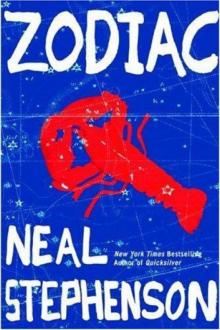 Zodiac: The Eco-Thriller
Zodiac: The Eco-Thriller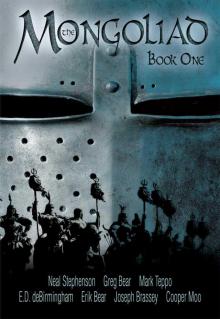 The Mongoliad: Book One
The Mongoliad: Book One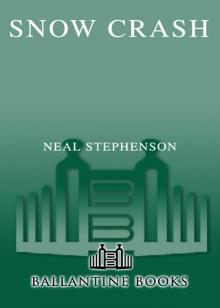 Snow Crash
Snow Crash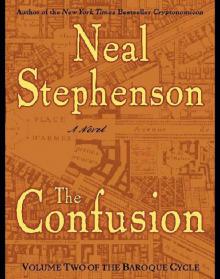 The Confusion: Volume Two of the Baroque Cycle
The Confusion: Volume Two of the Baroque Cycle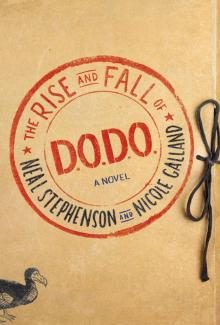 The Rise and Fall of D.O.D.O.
The Rise and Fall of D.O.D.O.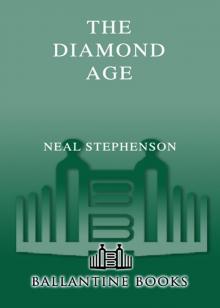 The Diamond Age: Or, a Young Lady's Illustrated Primer
The Diamond Age: Or, a Young Lady's Illustrated Primer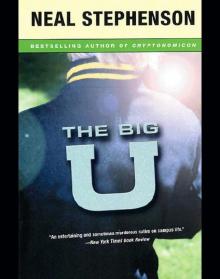 The Big U
The Big U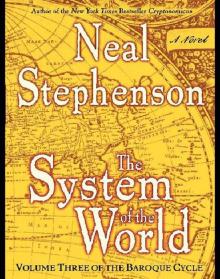 The System of the World: Volume Three of the Baroque Cycle
The System of the World: Volume Three of the Baroque Cycle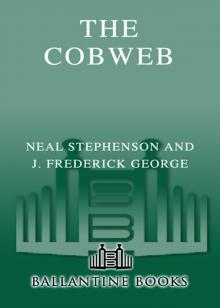 The Cobweb
The Cobweb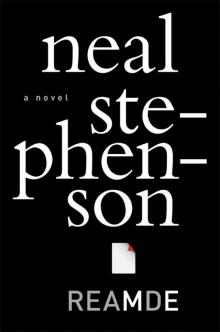 Reamde
Reamde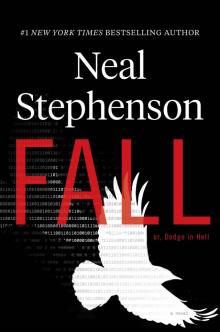 Fall; or, Dodge in Hell
Fall; or, Dodge in Hell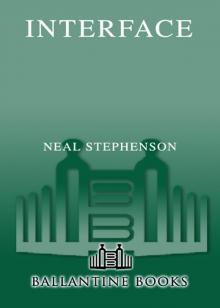 Interface
Interface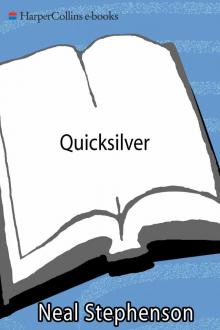 Quicksilver
Quicksilver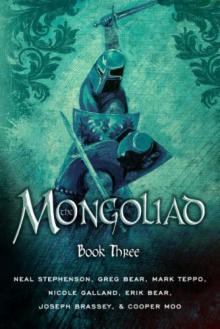 The Mongoliad: Book Three
The Mongoliad: Book Three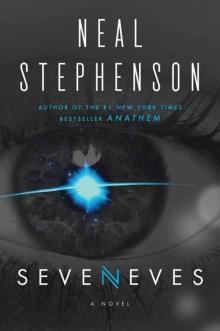 Seveneves
Seveneves Atmosphæra Incognita
Atmosphæra Incognita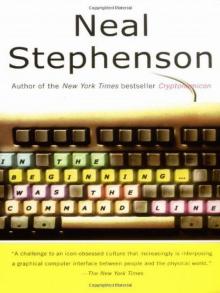 In the Beginning...Was the Command Line
In the Beginning...Was the Command Line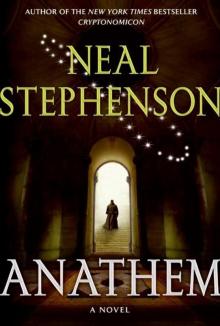 Anathem
Anathem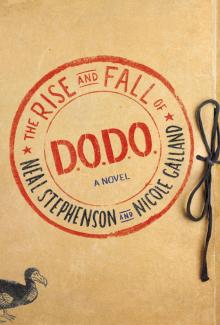 The Rise and Fall of D.O.D.O.: A Novel
The Rise and Fall of D.O.D.O.: A Novel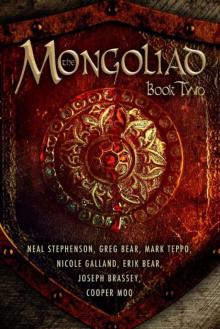 The Mongoliad: Book Two
The Mongoliad: Book Two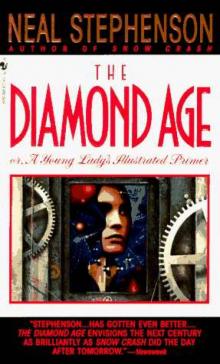 Diamond Age or a Young Lady's Illustrated Primer
Diamond Age or a Young Lady's Illustrated Primer THE System OF THE WORLD
THE System OF THE WORLD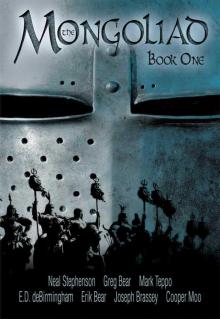 The Mongoliad: Book One tfs-1
The Mongoliad: Book One tfs-1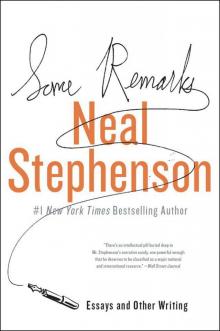 Some Remarks: Essays and Other Writing
Some Remarks: Essays and Other Writing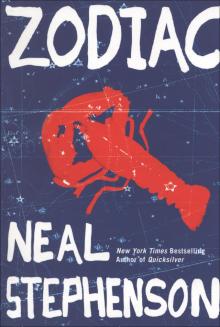 Zodiac
Zodiac Spew
Spew The Baroque Cycle: Quicksilver, the Confusion, and the System of the World
The Baroque Cycle: Quicksilver, the Confusion, and the System of the World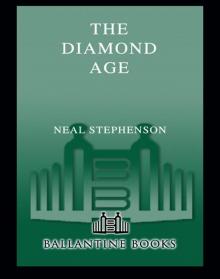 The Diamond Age
The Diamond Age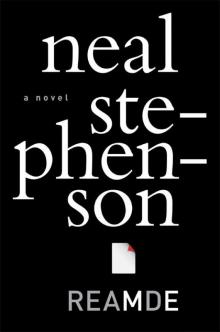 Reamde: A Novel
Reamde: A Novel In the Kingdom of Mao Bell
In the Kingdom of Mao Bell Mother Earth Mother Board
Mother Earth Mother Board Twelve Tomorrows - Visionary stories of the near future inspired by today's technologies
Twelve Tomorrows - Visionary stories of the near future inspired by today's technologies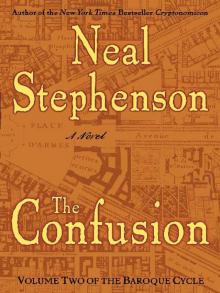 The Confusion
The Confusion The Great Simoleon Caper
The Great Simoleon Caper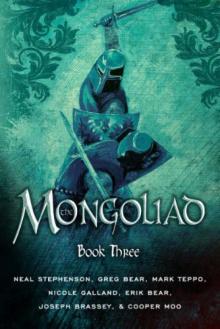 The Mongoliad: Book Three tfs-3
The Mongoliad: Book Three tfs-3